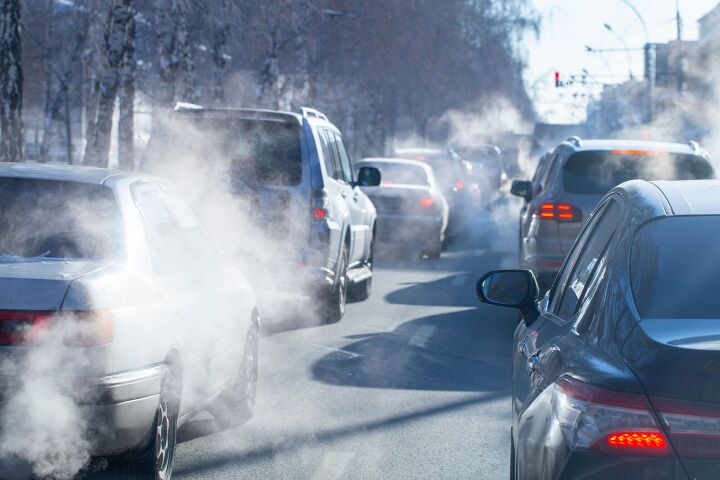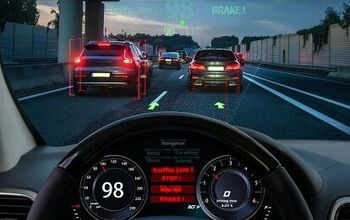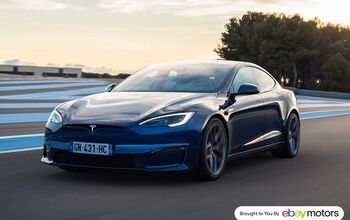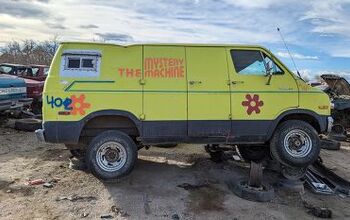Opinion: Politicians Are Lying About Biden's EPA Rule

The Biden Administration dropped a new rule limiting tailpipe emissions from passenger vehicles yesterday, and you know what that means.
Yes, it's lying season!
I want to focus on one particular egregious lie. You will soon see arguments from certain anti-EV types that new rule is an EV mandate. It very much is not.
First, some background from the New York Times:
The rule increasingly limits the amount of pollution allowed from tailpipes over time so that, by 2032, more than half the new cars sold in the United States would most likely be zero-emissions vehicles in order for carmakers to meet the standards.
We can argue all day long about whether the rule is too stringent or not, or whether automakers will be able to achieve the administration's goals. But as the Times points out, the government is NOT forcing the fleet to become all electric:
The E.P.A. regulation is not a ban. It does not mandate the sales of electric vehicles, and gas-powered cars and trucks could still be sold. Rather, it requires carmakers to meet tough new average emissions limits across their entire product line. It’s up to the manufacturers to decide how to comply.
That hasn't stopped the American Fuel & Petrochemical Manufacturers lobbying arm from calling the rule "Biden's EPA car ban." This is where I credit the oft-beleaguered Times, which I have hit at here and there, for not pulling punches and calling that assertion false.
It's not a ban on cars or internal-combustion engine cars. It's just not. And don't let those who have an anti-EV agenda lie to you.
Conversely, don't let the other side oversell things -- while reducing tailpipe emissions is a necessary step forward in fighting the negative effects of climate change, the production of the materials needed for electric and electrified vehicles has its own environmental toll.
It should also go without saying that the government's claims are estimates and the real-world effects of this rule won't be something we can measure just yet.
Now, if you want to argue that the new rule is effectively a mandate since it would likely force automakers to produce more battery-electric vehicles (or fuel-cell vehicles that use hydrogen to produce electric energy/power), that's fair. But I'd push back by suggesting that automakers will still be able to produce ICE vehicles under the new rule. Just, perhaps, fewer of them.
That said, consumers will still have their choice of vehicle type under the new rule. So, again, when someone claims this is a ban, they are either wrong or lying. Or both.
Again, from the NYT:
Under the Clean Air Act, the agency can limit the pollution generated by the total number of cars sold each year. E.P.A. officials said automakers could comply with the emissions caps by selling a mix of conventional gasoline-burning cars, hybrids, electric vehicles or other types of vehicles, such as cars powered by hydrogen. The new regulation, which would not apply to sales of used automobiles or light trucks, would take effect starting with model year 2027.
Car companies that exceed the new restrictions could face substantial penalties.
So this means that consumers will not necessarily be forced into pure BEVs -- ICE and hybrid vehicles will almost certainly remain available, at least for the foreseeable future.
Even the automaker's lobbying group seems to be onboard here, which is often not the case. Once more, take it away New York Times:
John Bozzella, president of the Alliance for Automotive Innovation, which represents 42 car companies that produce nearly all the new vehicles sold in the United States, said in a statement that the new rule was “a stretch goal” but one that offered some flexibility. “The future is electric,” he said. Still, the rules “are mindful of the importance of choice to drivers and preserve their ability to choose the vehicle that’s right for them,” he said.
When even the automakers, who often fight regulation like I fought bedtime as a child and who also generally lobby on behalf of consumer choice so they can sell what the public wants (and spend less on compliance), aren't whining too much, maybe the new rule isn't going to actually ban ICE cars and stifle the ability of buyers to choose?
That hasn't stopped grandstanding politicians from saying bull dung like this statement in the Times piece:
“They may wish for us all to drive E.V.s or no cars at all, but at the end of the day that’s not their decision,” said Elizabeth Murrill, the attorney general of Louisiana, a major oil and gas producing state that has been involved in a series of lawsuits challenging the Biden E.P.A. “There is a limit to their authority to remake society in their own vision and the court has realized that.”
This author has realized that you, Elizabeth Murrill, are lying about this being a mandate by framing it as a false choice. The Biden administration and EPA are NOT BANNING NON-ELECTRIC CARS.
I get fired up about this kind of stuff not because I approve of the rule -- I honestly haven't given thought to whether it will be effective or not, and any opinion/analysis discussion about it is best set aside for a separate article -- but because I am tired of self-interested politicians blatantly lying to our faces. Not spinning or shading the truth, but lying in the face of direct, contradictory evidence.
Yes all sides do it, though one side is more guilty than others over the past nine years, but this isn't a left/right thing. It's an intellectual honesty thing. Instead of lying that this new rule is a ban on ICE cars, why can't opponents argue it on the merits?
There are fair arguments to be made against the rule. Perhaps the cost of compliance will drive the cost of cars up. Perhaps this rule will force automakers to pump out EVs faster than charging infrastructure can keep up. Perhaps the government's claims about the environmental impact are too optimistic and complying with the new rule won't be effective in the fight against man-made climate change.
That's just three I thought of off the top of my head as I typed -- I am sure there are others.
Unfortunately, big money from gas and oil is behind certain politicians -- and, as our Louisiana example shows, some states make big money off of oil and gas production and would rather not see that jeopardized. It's also easy to scare the electorate by screaming that the government will take away your choice to buy whatever vehicle you want or need. Even a lot of folks on the left side of the political aisle are susceptible to fear-mongering based on lies.
Fear is effective. Not just on this issue -- think about how "tough on crime" politicians on both sides of the aisle often sway fearful voters even when statistics show crime in their area is low.
Perhaps I am just tired of being gaslit -- or as my dad sometime says, "don't pee in my face and tell me it's raining" (though he doesn't say "pee" exactly). If you are a politician, automaker, Big Oil lobbyist, or regular person who thinks the rule is bad for the auto industry and/or consumers, argue on the merits. Don't lie and claim it is something it is not.
To borrow another urological metaphor, I realize I am urinating into the wind when I ask powerful interests to not abandon the truth when arguing for their interests, but please, please, please: STOP LYING.
Soapbox, off.
[Image: NadyGinzburg/Shutterstock.com]
Become a TTAC insider. Get the latest news, features, TTAC takes, and everything else that gets to the truth about cars first by subscribing to our newsletter.

Tim Healey grew up around the auto-parts business and has always had a love for cars — his parents joke his first word was “‘Vette”. Despite this, he wanted to pursue a career in sports writing but he ended up falling semi-accidentally into the automotive-journalism industry, first at Consumer Guide Automotive and later at Web2Carz.com. He also worked as an industry analyst at Mintel Group and freelanced for About.com, CarFax, Vehix.com, High Gear Media, Torque News, FutureCar.com, Cars.com, among others, and of course Vertical Scope sites such as AutoGuide.com, Off-Road.com, and HybridCars.com. He’s an urbanite and as such, doesn’t need a daily driver, but if he had one, it would be compact, sporty, and have a manual transmission.
More by Tim Healey
Latest Car Reviews
Read moreLatest Product Reviews
Read moreRecent Comments
- Bd2 See guys it's like this : they say a that if you pay a man enough he will walk barefoot to hell and this Kia dealership could be analogized as hell with the Telluride being the holy grail of under $100K SUVs. Kia vehicles are so good, buyers are willing to tolerate the worst, sleaziest, nastiest, unethical and incompetent dealership experience just to park themselves in the best of the best instead of settling for a Lexus or Toyota or even an Acura. It's just a testament to the hard working young personnel at Hyundai Kia Genesis factories across Ala-BAM-A! who really give it their all including their lives to build the best that keeps the customer coming back no matter how terrible the front line dealership is. Let that sink in.
- Lou_BC I haven't burned a drop of gasoline in the past 2 years ;)
- THX1136 One thing the government does well is not look to the future when considering lawmaking/regulation of industries along with legislating via exceptions. Appreciate the article and the discussions. Don't think this is a 'one size fits all' situation. That, along with legislators who don't have the will to legislate what's best for all instead of the few. Probably wrong on that, but I've been wrong before. Got to keep my averages up, ya know.
- 28-Cars-Later "Put yourself in the shoes of an OEM product planner. What would you do in terms of future powertrain planning?"License Toyota's hybrid technology for the bread and butter models, offer a trucklet with a 4-6 ft bed, offer at least one profitable conventional model which would depend on which marque I am. "I think we can all agree that there will continue to be more battery-electric vehicles on the market, but the growth of EVs may slow."In the real world those BEVs all represent a financial loss and misallocated capital on an enormous scale. Must be nice to have zero accountability with government roles you can't be fired from when you should be 100 times over."There are also the technology and infrastructure aspects. Could hydrogen fuel cells take off?"I doubt it, I think it depends on the direction of the Japanese gov't/industry. I saw a video which explained the Japanese discovered natural resources near their islands which could be refined to produce hydrogen, which would finally grant them some energy semi-independence (historically all energy was imported and Fukushima put the kibosh on electrify everything). If there is an initiative to recover these resources and transition the JDM to hydrogen around 2030, the Japanese auto makers may slowly discontinue conventional drivetrain R&D and they'd have an incentive to push the change in other markets."Nissan says it won't invest in any new gas engines."I saw an interview Ghosn did around 2012 and when asked about the Leaf he said something to the effect of the Alliance needed to offer an EV because it could sell well in Africa and the Indian Subcontinent as well as allow them to skirt ManBearPig worship in the First World. He explained in the more remote regions of Africa/India electricity as a power source could usually be obtained whereas a refined petroleum supply chain was not always available. If you look at NIssan's moves from this lens things start to make more sense with the added bonus of eliminating warranty claims on subpar CVTs. If their plan is less emphasis on Japan, North America, and Europe where many better competitors are available and more in developing markets it could prove to be a wise move. "Not to mention that Chinese competition may come to our shores -- pending tariffs, of course." Nothing will change when the incumbent "president" is removed from power and the new puppet installed. There are more parties* which benefit from an artificially high price floor for any kind of vehicle than the consumers who would benefit from price deflation (but remember it was morally wrong when Orange Man threatened the ridiculously high tariffs his opponent just imposed). *Big Oil, politicians, environmentalists, TSLA, UAW, D2.5
- Tane94 $46 grand starting price for a Buick. Hard pass.


































Comments
Join the conversation
Sure. When two thirds have to be electric, everyone will have their choice of a gas car. Just like they can keep their health insurance.
Shill.
The bottom line is that in the new America coming the elites don't want you and me to own cars. They are going to make building cars so expensive that the will only be for the very rich and connected. You will eat bugs and ride the bus and live in a 500sq-ft. apartment and like it. HUD wants to quit giving federal for any development for single family homes and don't be surprised that FHA aren't going to give loans for single family homes in the very near future.